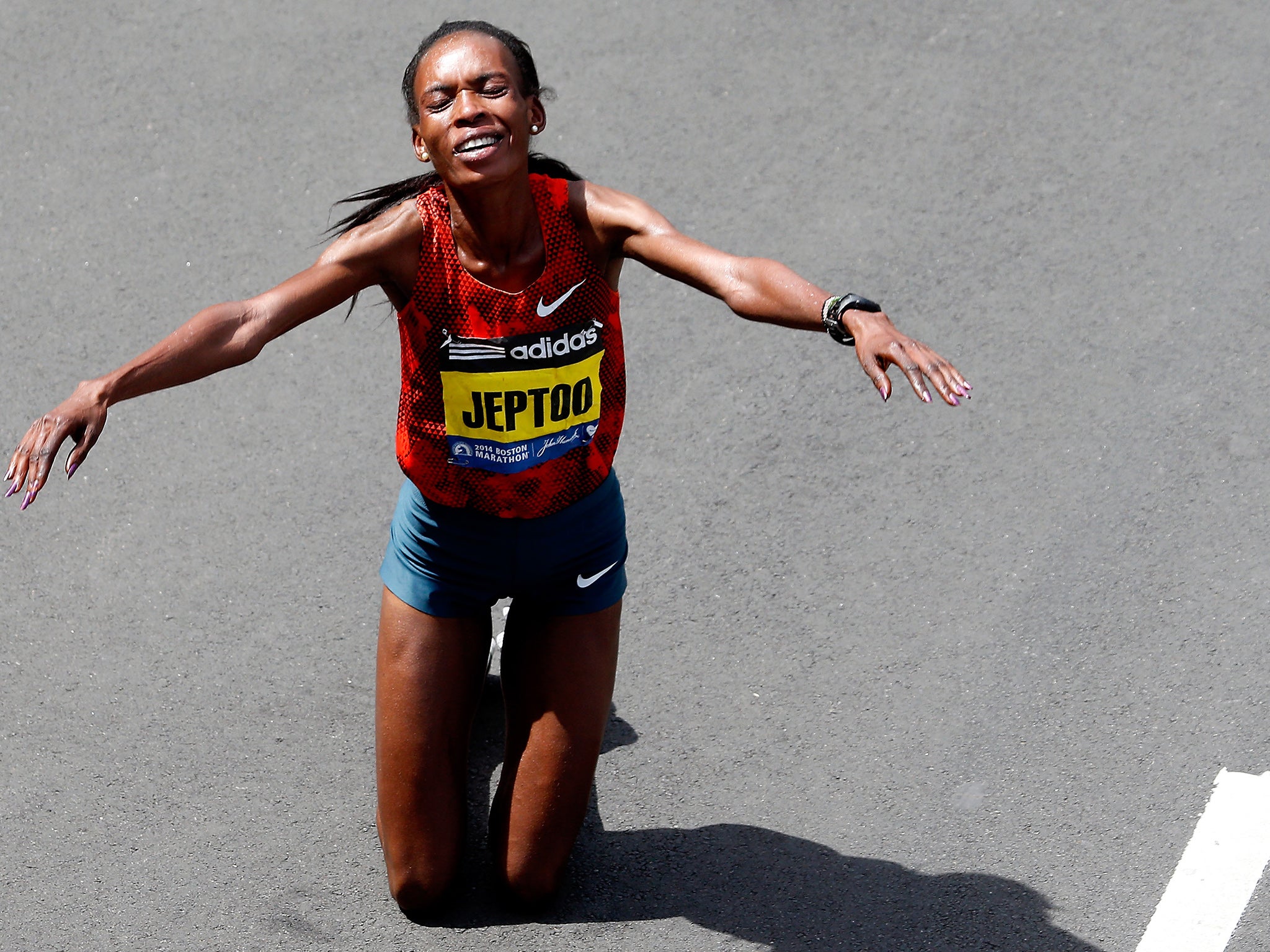Two more join Kenya drugs hall of shame
Kimetto and Kiplimo given two-year bans for using anabolic steroids

Last week, Kenya’s highest-profile athlete David Rudisha warned his countrymen and women they were besmirching the nation’s name and that of the wider sport with continued instances of doping.
The 800-metre world record holder’s comments have proved prescient with news that two more Kenyan athletes have been handed two-year bans.
Viola Chelangat Kimetto and Joyce Jemutai Kiplimo both tested positive for norandrosterone, an anabolic steroid and by-product of nandrolone. Eight Kenyan athletes are currently banned for using that particular drug, out of 11 serving sanctions.
In addition, five other unnamed athletes have been told to appear at Athletics Kenya’s offices by Thursday to address “particular issues revolving around doping cases”.
Kimetto failed a urine test after the Macau Galaxy Entertainment International Marathon in December last year, while Kiplimo tested positive after April’s Yangzhou Half Marathon.
Neither is a big name in global distance running, Kimetto’s most noticeable result being third place at the 2012 Athens Marathon, but it is yet another setback for a nation renowned as the benchmark of distance running.
In addition, Rita Jeptoo (above) faces being added to the list of sanctioned athletes when tests begin on her B sample today, with Athletics Kenya confident of making an announcement this week.
Jeptoo’s A sample tested positive for the blood-boosting drug EPO in an out-of-competition sample taken in Eldoret, where she trains, in September. If that is backed up by the B sample, the 33-year-old winner of the Boston and Chicago Marathons for the past two seasons will be banned for two years.
Britain’s distance runners train near Eldoret, with their next camp, in January, due to be headed by world marathon record holder Paula Radcliffe.
But Radcliffe insisted there was no need to worry from a British perspective: “It’s something that I guess I’ve been concerned about as I’ve been quite outspoken about it – and then I’m putting myself in that environment,” she said. “But all the time that I’ve been there, I’ve never seen evidence of doping. It’s just not something we’ve come across at the High Altitude Training Centre.”
Athletics has been flitting from one doping controversy to the next in recent weeks, the initial spark coming from a documentary on German television raising allegations of systemic doping in Russia.
In WDR’s three-part documentary, it was claimed that 150 athletes were reported to have produced suspicious blood values in testing between 2006 and 2008, among them 25 Kenyans.
Now former WADA (World Anti-Doping Agency) president Dick Pound has been asked to investigate all the documentary’s allegations.
Pound will chair the investigation, which formally gets under way next month, along with sports law specialist Professor Richard McLaren, a member of the Court of Arbitration for Sport who worked on the Major League Baseball steroids inquiry. A third member of the commission will be announced in due course.
WADA said the role of the commission was to ascertain if there had been any violations of its code, breaches of anti-doping rules by athletes or their entourage, and whether sanctions could be taken.
Kenya was previously singled out as a “hot spot” by former WADA president John Fahey, while former 3,000m steeplechase world champion Moses Kiptanui has warned that doping was rife among his countrymen and women.
Rudisha raised his own concerns: “It’s hard because Kenya is known for its good reputation in athletics and we have been having good athletes doing tremendously on the world stage without engaging themselves in this drug,” he said.
“We encourage people to work hard so they can achieve what they are gifted for and not to take a short cut. Because this is really bad, not only for our country but it’s also ruining the image of our sport.
“We want to tell Kenyans that doping is not good and it’s something that is not good for your own reputation. Imagine you have been running, for example, for five years. You have been doing very well then one day, when you are caught, you lose everything: your reputation, your respect from colleagues.”
As well as Kenya, the spotlight remains on Russia, whose athletics federation is holding its own investigation and yesterday requested an unedited version of German journalist Hajo Seppelt’s documentary into alleged doping.
Lawyer Artem Patsev said: “The Russian Athletics Federation (VFLA) has demanded an unedited version of Seppelt’s material to find out what exactly those who took part in the documentary actually said.
“Seppelt has not made the video recordings available yet. The president of the VFLA, Valentin Balakhnichev, gave an official request for the material and asked that copies are also sent to WADA and the International Association of Athletics Federations.”
Meanwhile, Welsh athletes Gareth Warburton and Rhys Williams are expected to find out the results of the hearing into their own failed drugs tests next month.
The verdict of an anti-doping panel, which met in London on Monday, is expected in the new year.
--
Banned Kenyans - 11 positive tests
Salome Biwott (norandrosterone), Wilson Eruope (EPO), Liliane Jelagat (EPO), Peris Jepkorir (norandrosterone), Viola Chelangat Kimetto (norandrosterone), Jacqueline Kiplimo (norandrosterone), Joyce Jemutai Kiplimo (norandrosterone), Nixon Kiplagat (norandrosterone), Moses Kurgat (salbutamol), Neriah Nyaboke Asiba (norandrosterone), Benjamin Kiprop Serem (nandrolone)
Subscribe to Independent Premium to bookmark this article
Want to bookmark your favourite articles and stories to read or reference later? Start your Independent Premium subscription today.

Join our commenting forum
Join thought-provoking conversations, follow other Independent readers and see their replies